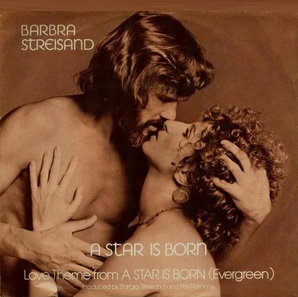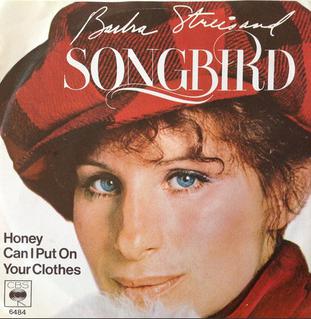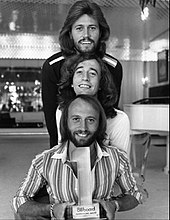"Memory" is a show tune composed by Andrew Lloyd Webber, with lyrics by Trevor Nunn based on poems by T. S. Eliot. It was written for the 1981 musical Cats, where it is sung primarily by the character Grizabella as a melancholic remembrance of her glamorous past and as a plea for acceptance. "Memory" is the climax of the musical and by far its best-known song, having achieved mainstream success outside of the musical. According to musicologist Jessica Sternfeld, writing in 2006, it is "by some estimations the most successful song ever from a musical."
The Adult Contemporary chart is published weekly by Billboard magazine and lists the most popular songs on adult contemporary radio stations in the United States. The chart is compiled based on airplay data submitted to Billboard by stations that are members of the Adult Contemporary radio panel. The chart debuted in Billboard magazine on July 17, 1961. Over the years, the chart has gone under a series of name changes, being called Easy Listening(1961–1962; 1965–1979), Middle-Road Singles(1962–1964), Pop-Standard Singles(1964–1965), Hot Adult Contemporary Tracks(1979–1982) and Adult Contemporary(1983–present). The current number-one song on the chart is "Flowers" by Miley Cyrus.

"The Way We Were" is a song by American singer Barbra Streisand from her fifteenth studio album of the same name. It was released as the album's lead single on September 27, 1973, through Columbia Records. The 7" single was distributed in two different formats, with the standard edition featuring B-side track "What Are You Doing the Rest of Your Life?"; the Mexico release instead included an instrumental B-side. The song was written by Alan Bergman, Marilyn Bergman, and Marvin Hamlisch, while production was solely handled by Marty Paich. "The Way We Were" was specifically produced for the record, in addition to three other tracks, including her then-upcoming single "All in Love Is Fair" (1974).

"Evergreen" is the theme song from the 1976 film A Star Is Born. It was composed and performed by American singer, songwriter, actress and director Barbra Streisand with lyrics by Paul Williams, and arranged by Ian Freebairn-Smith. The song was released on the soundtrack album to A Star Is Born.

Barbra Streisand is an American actress and singer. Her discography consists of 117 singles, 36 studio albums, 11 compilations, 11 live albums, and 15 soundtracks. According to the Recording Industry Association of America, Streisand is the second-best-selling female album artist in the United States with 68.5 million certified albums in the country, and a career total of 150 million making her one of the best-selling music artists

"Woman in Love" is a song performed by Barbra Streisand and taken from her 1980 album Guilty. The song was written by Barry and Robin Gibb of the Bee Gees, who received the 1980 Ivor Novello award for Best Song Musically and Lyrically. It is her fourth of four Platinum records, and is considered her greatest international hit.

"You Light Up My Life" is a ballad written by Joseph Brooks, and originally recorded by Kasey Cisyk for the soundtrack album to the 1977 film of the same title. The song was lip synced in the film by its lead actress, Didi Conn. The best-known cover version of the song is a cover by Debby Boone, the daughter of singer Pat Boone. It held the No. 1 position on the Billboard Hot 100 chart for ten consecutive weeks in 1977 and topped Record World magazine's Top 100 Singles Chart for a record 13 weeks.

"Guilty" is a vocal duet between Barbra Streisand and Barry Gibb. The song was written by all three Bee Gees: Barry, Robin & Maurice Gibb. Released as a single from Streisand's 1980 album of the same name. "Guilty" peaked at No. 3 on the US Billboard Hot 100 chart and No. 5 on the adult contemporary chart. In the UK, the song reached No. 34 on the UK Singles Chart. The single was certified gold by the RIAA. In addition, "Guilty" won a Grammy Award in the category Best Pop Vocal Performance, Duo or Group. The song also appeared on the 2001 Bee Gees compilation, Their Greatest Hits: The Record.

"One Less Bell to Answer" is a song written by Burt Bacharach and Hal David. Originally written in 1967 for Keely Smith, the song was rediscovered in late 1969 by Bones Howe, the producer for the 5th Dimension, and the song was included on the group's 1970 debut album for Bell Records, Portrait. Lead vocals on the single were sung by Marilyn McCoo.

"What Kind of Fool" is a 1981 vocal duet by singers Barbra Streisand and Barry Gibb. The song was written by Gibb and Albhy Galuten. Released as the third single from Streisand's album Guilty (1980), "What Kind of Fool" was the third consecutive top ten single from the album in the United States. "Woman in Love" reached number one on the Billboard Hot 100 chart, and the album's title track reached number three, both in late 1980. "What Kind of Fool" spent three weeks at number ten on the Hot 100 in March and April 1981. It also spent four weeks atop the Billboard adult contemporary chart.

"My Heart Belongs to Me" is a popular song from 1977. It was originally performed by the songwriter, Alan Gordon, but the more famous version of the song was recorded by American singer and actress Barbra Streisand.

"Songbird" is the title track and first single released from Barbra Streisand's 1978 album Songbird. It was written by Dave Wolfert and Steve Nelson and produced by Gary Klein.

When Will I See You Again is an album by American pop singer Johnny Mathis that was released in March 1975 by Columbia Records and was again predominantly composed of covers of recent hit songs by other artists.

"Didn't We" is a song recorded by Irish singer and actor Richard Harris for his debut studio album, A Tramp Shining (1968). It was written and produced by Jimmy Webb and originally served as the B-side to Harris' 1968 single "MacArthur Park". "Didn't We" was then distributed as the record's single by Dunhill Records, also in 1968. A traditional pop song, Harris sings about his life in the past. Commercially, it charted at lower positions of both the United States and Canada, and in the higher ranks of their Adult Contemporary component charts. Harris featured "Didn't We" on several of his greatest hits albums, including The Richard Harris Collection: His Greatest Performances from 1973. That same year, the song was reissued as a promotional single paired alongside his 1971 single "My Boy".















